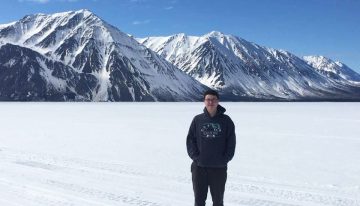 By Dr. Deb Chen, Centre for Teaching, Learning and Technology
By Dr. Deb Chen, Centre for Teaching, Learning and Technology
Rhys participated in the CBR Job Shadow Program back in February 2017, working closely with Bryan Lin and Frank Lee, PhD candidates from the Pryzdial lab. Read on to find out more about Rhys, his learning experience at CBR, and his advice in engaging with people living with Hemophilia A.
DC: Briefly, tell us a little bit about yourself.
RW: I am currently in Grade 12 and am on track to graduate and to apply for University. I plan to major in biochemistry for my first degree.
Soon after birth, I was diagnosed with severe Hemophilia A, which means it takes longer for my blood to clot than that of the average person. Fortunately, I never was limited from the experiences that other people could have, such as playing soccer and rugby. Additionally, I am the Regimental Sergeant Major, aka the top leading cadet, for the Royal Canadian Army Cadet Corps’ Yukon Regiment (2685) and I play the alto sax with the All City Band of Whitehorse, Yukon.
DC: What was the biggest highlight of your CBR Job Shadow Program?
RW: The biggest highlight for me was having the opportunity to be exposed to a different point of view on how various jobs in medical and scientific research were carried out. It was particularly interesting to see how goals are set and the process in which they are met in the lab. For example, I learnt that one would first consider different variables and prepare an experiment on paper before actually conducting the experiment to test one’s idea or theory. Also, I didn’t know that scientific collaboration can take anywhere from days to years!
DC: How did this CBR Job Shadow experience inform your career and/or learning goals?
RW: It gave me the perspective to make a more educated choice on my future career. The experience allowed me to discover what work and education I needed in order to apply to a research position, as well what an average day of work looks like. Understanding the life of a research scientist, how their goals are established, and the tasks required to accomplish these, have definitely and positively influenced how I will make decisions regarding my career path.
DC: As someone living with hemophilia, what are some considerations that you have in your daily life that others may not know about?
RW: As a person with hemophilia, I am unable to do many things that most people partake in. For example, I have to take intravenous medication before any physical activity, and I am often on prophylaxis treatment to prevent bleeds. I am also more susceptible to internal damage from bleeding, meaning that I have to be more careful in my life to avoid permanent damage.

Rhys Watson enjoying the outdoors
DC: What is one thing that we, as a scientific community and as members of our collective society, can start doing when engaging with someone living with hemophilia to convey sensitivity and respect?
RW: In all honesty, hemophilia sounds worse than it actually is. Yes, there are real factors that can prohibit hemophiliacs from doing certain things and approaching hemophiliacs with caution may be smart. However, limiting their experiences and completely stopping them from engaging in dreams, such as flying and skydiving, are not necessary and are often disrespectful. Those who are living with hemophilia know their body and the limits.
Unless the activity is actually detrimental to our health, make sure that you don’t keep us locked in a box. More than anything, we want to be treated like normal human beings who can lead fulfilling and rich lives – especially when it comes to pursuing interests like traveling and partaking in sports. Being overcautious could make us feel excluded, alienated, and separated from the rest of humanity.
This interview with Rhys demonstrates the value of reciprocity and of sharing experiences. While Rhys gained insights and perspectives about our work as research scientists through the CBR Job Shadow Program, the advice that Rhys shared through his experiences is powerfully relevant in all of our relationships. This is an open invitation to engage in exploratory dialogue, to stay curious, to examine our assumptions, and to seek clarification whenever we engage with those whose lives we do not fully understand.


